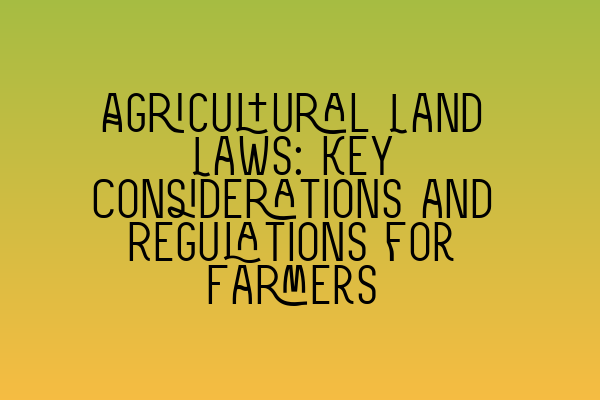Agricultural Land Laws: Key Considerations and Regulations for Farmers
As a farmer, understanding agricultural land laws is crucial for the success of your business. Whether you are purchasing or leasing land, it is important to be aware of the key considerations and regulations that govern agricultural land. This blog post will provide you with valuable insights into these laws, helping you navigate the legal landscape and make informed decisions for your farm.
1. The Importance of Agricultural Land Laws
Agricultural land laws exist to protect the interests of both farmers and the wider community. These laws ensure that agricultural land is used sustainably, safeguarding the environment and the livelihoods of farmers. By complying with land laws, you can avoid legal troubles and potential fines, while also contributing to the preservation and growth of the agricultural industry.
2. Land Use Planning
One key consideration when it comes to agricultural land is land use planning. This involves determining the best use of land based on its characteristics and surrounding environment. Local planning authorities have the power to restrict or grant permission for certain types of agricultural activities on specific plots of land. Understanding the local development plan and consulting with planning authorities before making any changes to your land use is crucial to avoid any potential legal issues.
3. Agricultural Tenancies
If you are leasing agricultural land, it is important to be aware of the regulations surrounding agricultural tenancies. These agreements provide farmers with the right to use the land for agricultural purposes. The Agricultural Holdings Act 1986 and the Agricultural Tenancies Act 1995 outline the rights and responsibilities of both landlords and tenants in these agreements. Familiarizing yourself with these acts will help you negotiate fair terms with landowners and ensure a smooth tenancy.
4. Environmental Considerations
Environmental regulations play a significant role in agricultural land laws. Farmers are required to comply with various environmental standards to minimize the impact of their operations on the surrounding ecosystem. This includes practices such as managing farm waste, protecting water sources, and implementing sustainable farming techniques. By following these regulations, you not only contribute to the preservation of the environment but also demonstrate your commitment to responsible farming practices.
5. Land and Property Rights
When purchasing agricultural land, it is essential to understand the legal rights and restrictions that come with the property. Conducting a thorough due diligence process will help you identify any potential issues, such as restrictive covenants or easements, that may affect your use of the land. Seeking legal advice and conducting land surveys can ensure that you have a clear understanding of the property’s boundaries and any encumbrances that may exist.
6. Animal Health and Welfare
Animal health and welfare are also governed by specific regulations that farmers must follow. These regulations aim to protect the welfare of farmed animals and ensure that they are treated ethically. From housing conditions and feeding practices to disease control and transportation, farmers must adhere to rigorous standards to ensure the well-being of their livestock. Familiarizing yourself with these regulations will help you maintain high standards of animal care and avoid any legal repercussions.
7. Employment Law
If you employ staff on your farm, it is important to be aware of the applicable employment laws. These laws cover areas such as minimum wage, working hours, health and safety regulations, and workers’ rights. Complying with employment laws not only protects your employees but also helps create a harmonious and productive working environment.
8. Seek Professional Advice
Navigating agricultural land laws can be complex, and it is always advisable to seek professional legal advice when dealing with legal matters concerning your farm. An experienced solicitor with expertise in property law can provide valuable guidance and ensure that you are fully compliant with all relevant regulations.
In conclusion, understanding agricultural land laws and regulations is essential for farmers who want to operate within the law, protect their interests, and contribute to the sustainable growth of the industry. By considering land use planning, agricultural tenancies, environmental regulations, property rights, animal health and welfare, and employment law, you can ensure that your farm operates legally and ethically. Seeking professional advice when necessary will provide you with the necessary support and guidance to navigate the legal complexities of agricultural land laws.
For more information on legal topics relevant to prospective solicitors such as SQE exam preparation and important exam dates, please check out the following articles:
– SQE 1 Practice Exam Questions
– SQE 1 Practice Mocks FLK1 FLK2
– SQE 2 Preparation Courses
– SQE 1 Preparation Courses
– SRA SQE Exam Dates
Remember, staying informed and compliant with the relevant laws and regulations will help you thrive as a farmer and ensure the long-term sustainability of your agricultural business.
